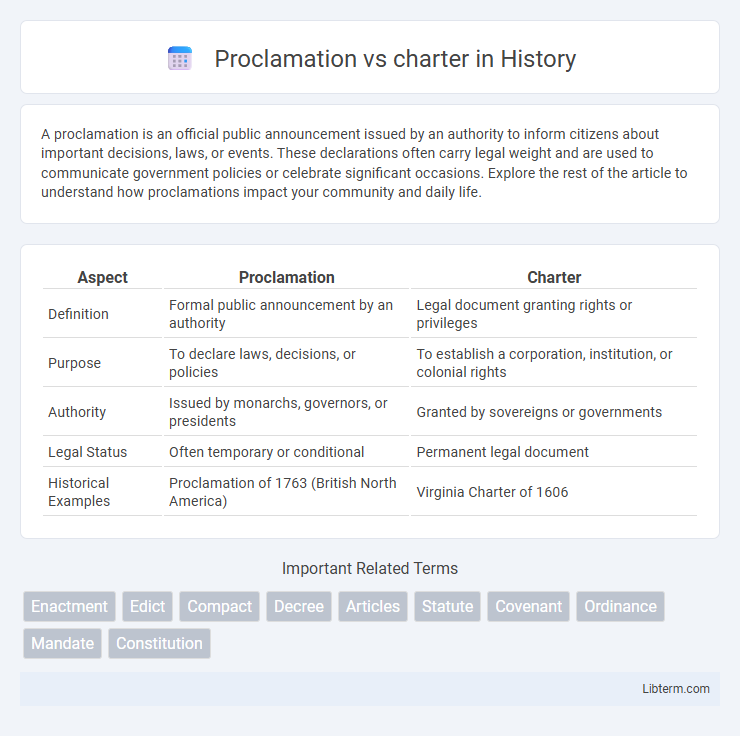A proclamation is an official public announcement issued by an authority to inform citizens about important decisions, laws, or events. These declarations often carry legal weight and are used to communicate government policies or celebrate significant occasions. Explore the rest of the article to understand how proclamations impact your community and daily life.
Table of Comparison
| Aspect | Proclamation | Charter |
|---|---|---|
| Definition | Formal public announcement by an authority | Legal document granting rights or privileges |
| Purpose | To declare laws, decisions, or policies | To establish a corporation, institution, or colonial rights |
| Authority | Issued by monarchs, governors, or presidents | Granted by sovereigns or governments |
| Legal Status | Often temporary or conditional | Permanent legal document |
| Historical Examples | Proclamation of 1763 (British North America) | Virginia Charter of 1606 |
Definition of Proclamation
A proclamation is an official public announcement issued by a government or authority to declare a legal matter, policy, or event, often carrying immediate effect or ceremonial importance. It serves to inform the public, enforce laws, or signal official decisions without necessarily granting rights or privileges. Unlike a charter, which is a formal document establishing rights, privileges, or institutions, proclamations primarily function as authoritative declarations.
Definition of Charter
A charter is a formal document issued by a sovereign authority or government granting rights, privileges, or powers to an individual, corporation, or institution. It serves as a legal foundation establishing the entity's existence, governance structure, and operational guidelines. Unlike a proclamation, which is often a public announcement or declaration, a charter provides a specific and binding framework for organizational or territorial authority.
Key Differences Between Proclamation and Charter
Proclamations are official announcements issued by a government or authority to declare a policy, event, or legal status, often temporary and not requiring a formal agreement. Charters serve as foundational documents granting rights, privileges, or establishing an organization, often with legal permanence and detailed conditions. The key difference lies in proclamations being declarative and typically non-binding, while charters function as contractual instruments conferring legally enforceable rights.
Historical Contexts of Proclamations
Proclamations in historical contexts have often served as official public announcements issued by sovereigns or governments to declare laws, policies, or significant events, such as the Emancipation Proclamation during the American Civil War. Unlike charters, which establish the foundation or rights of organizations and institutions, proclamations tend to address immediate political or social directives with widespread impact. The historical significance of proclamations lies in their role as tools of governance and public communication that shape societal structures and legal frameworks.
Historical Contexts of Charters
Historical charters served as formal documents granted by monarchs or governing authorities to establish rights, privileges, or land ownership, often codifying agreements and legal frameworks in medieval and early modern societies. Unlike proclamations, which typically announced royal decrees or policy changes to the public, charters provided enduring legal recognition and structured governance, such as city charters defining municipal autonomy. Notable examples include the Magna Carta of 1215, which limited royal power and laid foundational principles for constitutional law in England.
Legal Implications of Proclamations
Proclamations carry legal weight by officially declaring government decisions, policies, or changes in law without requiring parliamentary approval, often used to enforce executive authority in urgent or specific matters. Unlike charters, which grant rights or establish institutions with a formal and often enduring legal foundation, proclamations can modify the applicability of laws temporarily or trigger the commencement of statutory provisions. Courts recognize proclamations as binding when issued under proper legal authority, though their validity may be contested if found inconsistent with existing statutes or constitutional mandates.
Legal Implications of Charters
Charters establish specific legal rights and obligations for individuals or entities, creating binding agreements recognized by courts and government authorities. Unlike proclamations, which are often unilateral declarations without enforceable legal status, charters function as formal instruments granting privileges or defining corporate governance structures. Legal implications of charters include enforceable contract terms, property rights, and regulatory compliance requirements that ensure stability and accountability within legal frameworks.
Impact on Governance and Authority
A proclamation typically serves as a formal announcement issued by a sovereign authority, establishing temporary directives or symbolic declarations without altering the legal framework, thus exerting limited long-term impact on governance and authority. In contrast, a charter is a foundational legal document that grants rights, defines governance structures, and establishes enduring authority, directly shaping institutional power and administrative functions. Charters often codify the creation and scope of governments or organizations, embedding authoritative legitimacy and operational guidelines that influence governance processes over an extended period.
Modern Usage of Proclamations and Charters
Proclamations in modern usage are official public announcements issued by governmental authorities to declare policies, regulations, or significant events, often serving urgent or ceremonial purposes without establishing legal rights. Charters typically function as formal documents granting rights, privileges, or authority to organizations, municipalities, or corporations, often serving as foundational legal instruments defining governance structures and operational mandates. Both proclamations and charters play critical roles in legal and administrative contexts, with proclamations emphasizing declarative authority and charters emphasizing granted rights and organizational legitimacy.
Choosing Between a Proclamation and a Charter
Choosing between a proclamation and a charter depends on the legal authority and purpose of the document; proclamations typically serve as official public announcements issued by a government authority, while charters establish the rights, privileges, or functions of an organization or municipality. Proclamations are often temporary and declarative, whereas charters provide a permanent and formalized legal foundation. Decision-makers should assess whether the goal is to announce a specific event or policy (proclamation) or to define governance, operational structure, and rights (charter).
Proclamation Infographic

 libterm.com
libterm.com